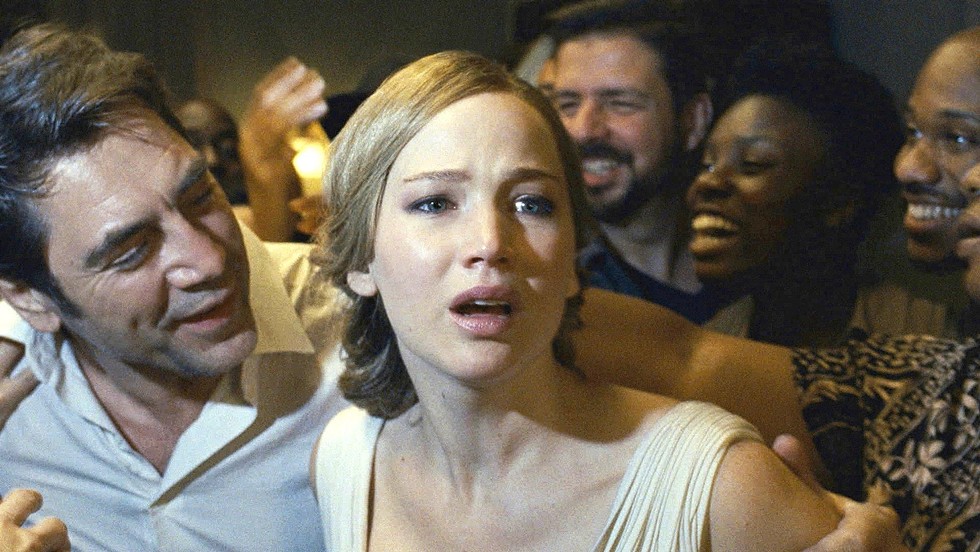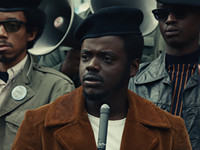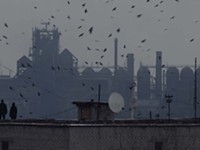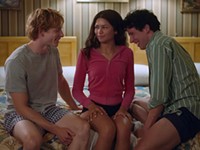[
{
"name": "500x250 Ad",
"insertPoint": "5",
"component": "15667920",
"parentWrapperClass": "",
"requiredCountToDisplay": "1"
}
]
The Las Vegas-based polling firm CinemaScore, since 1978, has been conducting weekly surveys of moviegoers, asking them to assign a letter grade based on their reaction to a new release they’ve just seen. The system gives some insight into the average person’s movie opinions and, for the studios, helps gauge how successful their films might be.
The audiences being polled are the ones who’ve shown up on opening night, meaning they should be the most eager to see the film, and as a result, they tend to be pretty generous with their grading. Anything below a B is on shaky ground, and it’s rare for a film to achieve an F rating. In practice this process really ends up measuring whether a film delivered on the message its marketing promised. If a ticket buyer got exactly what they expected, they’re generally pretty happy. If not, they’re probably pretty disappointed, if not outright angry.
That seems to be exactly what happened with “mother!,” writer-director Darren Aronofsky’s deranged horror allegory. The film’s marketing promised Aronofsky in “Black Swan” mode, but the final product is more in line with the filmmaker’s esoteric “Noah” and “The Fountain” than with that more accessible Oscar-winner. And so “mother!” has received the dubious honor of landing that F rating (one of only 11 films to do so over the last 13 years). People may not be leaving happy, but any film that inspires that strong a reaction from audiences is worth at least paying attention to.
“mother!” centers around a young housewife, played by Jennifer Lawrence (none of the characters in the film have proper names), and her much older husband (Javier Bardem). They live in a large white house, cut off from the rest of the world. He’s a poet, but is suffering from severe writer’s block. She spends her time renovating their home, which we learn he grew up in, before it was burned in a devastating fire many years ago. Their relationship seems slightly strained, but in a way we can’t quite put a finger on.
Their relative tranquility is interrupted when a man (Ed Harris) shows up on their doorstep unannounced, believing their home to be a bed and breakfast. Eventually it turns out the man is a huge fan of the poet’s work, and so the writer invites him to spend the night, against his wife’s wishes. Shortly thereafter, the guest’s judgmental, cold-eyed wife (a delightful Michelle Pfeiffer) comes knocking. Then their feuding sons (played by real-life brothers Domhnall and Brian Gleeson) show up.
There’s a death, and suddenly friends and family are coming to pay their respects and mourn. Those people are followed by still others, and on and on. Eventually all hell breaks loose, and the wife tries in vain to maintain order. There’s also a bloody, seeping wound that opens up in the upstairs floorboards. Lawrence’s character is never quite sure what’s happening or who these people are who insist on invading her home. As things grow more frenzied, the film takes on the feeling of a nightmarish fever dream.
The precise meaning of it all is up for interpretation, and viewers have been weighing in all over the Internet with their own theories ever since the film opened. Is it Aronofsky’s own self-loathing summation of the artistic process? A misogynistic examination of the relationship between an artist and his muse, whose entire existence is consumed with supporting the artist and his work? Or is it a critique of that very idea?
Perhaps it’s a biblical allegory? Or it could be an environmentalist screed about what humanity’s savagery has wrought for our planet — a scream in the face of a society that’s gone and screwed everything up. Aronofsky asks us to treat the film as a puzzle, but the picture that emerges once all the pieces are locked into place may appear different to anyone who looks at it.
The filmmaker himself has given interviews stating exactly what he intended with this story — but there isn’t fun in settling on one “true” reading of a film. Besides, once a piece of art has left the artist’s hands, they’re no longer in control of its message; viewers are free to see what they will, and there aren’t any wrong answers.
“mother!” is a lot of things: it’s bold and blunt, and by turns, it’s brutal, absurd, horrific, hilarious, and occasionally deeply stupid. Not everything works, but it is a triumph of mood, texture, and tone. The sound design in particular is award-worthy, allowing us to hear every creak and groan of the house as the chaos within spirals out of control.
What’s truly impressive is that Aronofsky was able to create a movie like this and have it be released by a major studio. It’s the kind of risky endeavor the studio system so rarely allows, though whether or not it adds up to anything worth giving a second thought to is entirely in the eye of the beholder. But I’m grateful that we’re given the chance to decide in the first place.
The audiences being polled are the ones who’ve shown up on opening night, meaning they should be the most eager to see the film, and as a result, they tend to be pretty generous with their grading. Anything below a B is on shaky ground, and it’s rare for a film to achieve an F rating. In practice this process really ends up measuring whether a film delivered on the message its marketing promised. If a ticket buyer got exactly what they expected, they’re generally pretty happy. If not, they’re probably pretty disappointed, if not outright angry.
That seems to be exactly what happened with “mother!,” writer-director Darren Aronofsky’s deranged horror allegory. The film’s marketing promised Aronofsky in “Black Swan” mode, but the final product is more in line with the filmmaker’s esoteric “Noah” and “The Fountain” than with that more accessible Oscar-winner. And so “mother!” has received the dubious honor of landing that F rating (one of only 11 films to do so over the last 13 years). People may not be leaving happy, but any film that inspires that strong a reaction from audiences is worth at least paying attention to.
“mother!” centers around a young housewife, played by Jennifer Lawrence (none of the characters in the film have proper names), and her much older husband (Javier Bardem). They live in a large white house, cut off from the rest of the world. He’s a poet, but is suffering from severe writer’s block. She spends her time renovating their home, which we learn he grew up in, before it was burned in a devastating fire many years ago. Their relationship seems slightly strained, but in a way we can’t quite put a finger on.
Their relative tranquility is interrupted when a man (Ed Harris) shows up on their doorstep unannounced, believing their home to be a bed and breakfast. Eventually it turns out the man is a huge fan of the poet’s work, and so the writer invites him to spend the night, against his wife’s wishes. Shortly thereafter, the guest’s judgmental, cold-eyed wife (a delightful Michelle Pfeiffer) comes knocking. Then their feuding sons (played by real-life brothers Domhnall and Brian Gleeson) show up.
There’s a death, and suddenly friends and family are coming to pay their respects and mourn. Those people are followed by still others, and on and on. Eventually all hell breaks loose, and the wife tries in vain to maintain order. There’s also a bloody, seeping wound that opens up in the upstairs floorboards. Lawrence’s character is never quite sure what’s happening or who these people are who insist on invading her home. As things grow more frenzied, the film takes on the feeling of a nightmarish fever dream.
The precise meaning of it all is up for interpretation, and viewers have been weighing in all over the Internet with their own theories ever since the film opened. Is it Aronofsky’s own self-loathing summation of the artistic process? A misogynistic examination of the relationship between an artist and his muse, whose entire existence is consumed with supporting the artist and his work? Or is it a critique of that very idea?
Perhaps it’s a biblical allegory? Or it could be an environmentalist screed about what humanity’s savagery has wrought for our planet — a scream in the face of a society that’s gone and screwed everything up. Aronofsky asks us to treat the film as a puzzle, but the picture that emerges once all the pieces are locked into place may appear different to anyone who looks at it.
The filmmaker himself has given interviews stating exactly what he intended with this story — but there isn’t fun in settling on one “true” reading of a film. Besides, once a piece of art has left the artist’s hands, they’re no longer in control of its message; viewers are free to see what they will, and there aren’t any wrong answers.
“mother!” is a lot of things: it’s bold and blunt, and by turns, it’s brutal, absurd, horrific, hilarious, and occasionally deeply stupid. Not everything works, but it is a triumph of mood, texture, and tone. The sound design in particular is award-worthy, allowing us to hear every creak and groan of the house as the chaos within spirals out of control.
What’s truly impressive is that Aronofsky was able to create a movie like this and have it be released by a major studio. It’s the kind of risky endeavor the studio system so rarely allows, though whether or not it adds up to anything worth giving a second thought to is entirely in the eye of the beholder. But I’m grateful that we’re given the chance to decide in the first place.






